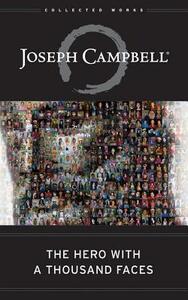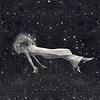You need to sign in or sign up before continuing.
Take a photo of a barcode or cover
If you aren't an academic, this is primarily interesting because of the impact it's had on pop culture creators. Pretty much the only myth I can think of that convincingly maps onto all of this book is Star Wars, which was based on it. For most of the other mythologies, I just don't find it convincing. Campbell cherrypicks and stitches together examples that fit his theory and doesn't adequately explain why other myths diverge. This is unconvincing, and worse, dull. People encounter more situations in life than coming-of-age/heroic apotheosis narratives. Not everyone, indeed, hardly anyone, maps onto the archetypal hero narrative for more than a brief period of their lives. Viewing all stories as a way to make sense of either coming-of-age or reconciling oneself with death flattens the personalities of mythology, flattens cultural differences, and flattens life.
Additional complaints:
If my high school English and History teachers marked this up, it would be covered in red "Explain your quotes". Some paragraphs are composed literally just of quotes, with no lead-in or explanation. When quotes are linked to Campbell's overall point, he presents the mythological narratives as fact, without discussing the source or acknowledging that there could be different varieties of the myth that have different biases or goals.
SUPER SEXIST: Campbell pretty much thinks women are Magical Pixie Life Forces that only exist as wombs and prizes. It's really gross, I hated it, and he neglects my favorite parts of mythology in order to allow this argument to stand. Athena is mentioned once in the whole book, and only in the Table of Contents description of an illustration for the Jason myth. Campbell clearly didn't have the intellectual imagination or integrity to question how she challenged his interpretation of mythology.
Poor signposting and definition of basic terms: Throughout the book, Campbell fails to explain where his argument is going or why a piece of evidence is important. There's a lot of thesis-last writing where he explains where he was going with something after he goes through the whole argument. This is a level-one, "look, I'm fancy" rhetorical technique that typically gets drummed out of writers in freshman seminars because it is intellectually lazy and annoying as all hell to read. Campbell also waffles throughout the book about the basic way he wants to relate to mythology. Is it a manifestation of universal sub-conscious tensions? Is it somewhere between history and literature? Is it the result of an actual Force-like energy surging throughout the universe? Campbell doesn't really know.
I'm only giving this 2 points instead of 1 because Campbell does at least appear fairly widely-read, incorporating myths from well beyond the European tradition including Buddhism, Hinduism and North and South American native peoples. There were at least five myths I'd never found written out in longform before, and that was worthwhile. His reading of a lot of Buddhist myths seemed very off-base to me, but I can't criticize it because I'm not that widely read in Buddhist theology.
Additional complaints:
If my high school English and History teachers marked this up, it would be covered in red "Explain your quotes". Some paragraphs are composed literally just of quotes, with no lead-in or explanation. When quotes are linked to Campbell's overall point, he presents the mythological narratives as fact, without discussing the source or acknowledging that there could be different varieties of the myth that have different biases or goals.
SUPER SEXIST: Campbell pretty much thinks women are Magical Pixie Life Forces that only exist as wombs and prizes. It's really gross, I hated it, and he neglects my favorite parts of mythology in order to allow this argument to stand. Athena is mentioned once in the whole book, and only in the Table of Contents description of an illustration for the Jason myth. Campbell clearly didn't have the intellectual imagination or integrity to question how she challenged his interpretation of mythology.
Poor signposting and definition of basic terms: Throughout the book, Campbell fails to explain where his argument is going or why a piece of evidence is important. There's a lot of thesis-last writing where he explains where he was going with something after he goes through the whole argument. This is a level-one, "look, I'm fancy" rhetorical technique that typically gets drummed out of writers in freshman seminars because it is intellectually lazy and annoying as all hell to read. Campbell also waffles throughout the book about the basic way he wants to relate to mythology. Is it a manifestation of universal sub-conscious tensions? Is it somewhere between history and literature? Is it the result of an actual Force-like energy surging throughout the universe? Campbell doesn't really know.
I'm only giving this 2 points instead of 1 because Campbell does at least appear fairly widely-read, incorporating myths from well beyond the European tradition including Buddhism, Hinduism and North and South American native peoples. There were at least five myths I'd never found written out in longform before, and that was worthwhile. His reading of a lot of Buddhist myths seemed very off-base to me, but I can't criticize it because I'm not that widely read in Buddhist theology.
challenging
informative
mysterious
slow-paced
I enjoyed the mythology very much, however, I found large parts to be misogynistic (or, as a good friend pointed out, dated) with far too much emphasis on Freud's theories. I can see the application of these ideas as relevant to most literature.
A major work that I wish I'd experienced in class, or with others, rather than on my own. The mythological elements are fascinating, especially comparing legends from various regions, and linking them to a specific journey like this does a lot to demonstrate the similarities between so many legends. But the focus on psychoanalysis didn't work for me, and there were parts I simply didn't grasp because they felt under-explained.
Reframing it in my mind as the blueprint for George Lucas' work in Star Wars helped. It was obviously influential, and that reference was a major aid in recognizing what was being discussed.
I don't know that I'd recommend this outside of academic study, or adjacent purposes. But it's certainly an interesting and enlightening work that has unquestionably shaped modern storytelling by giving shape to the stories of the ancient and medieval worlds.
Reframing it in my mind as the blueprint for George Lucas' work in Star Wars helped. It was obviously influential, and that reference was a major aid in recognizing what was being discussed.
I don't know that I'd recommend this outside of academic study, or adjacent purposes. But it's certainly an interesting and enlightening work that has unquestionably shaped modern storytelling by giving shape to the stories of the ancient and medieval worlds.
I know I should have loved this, but I just couldn't do it. Dry, dry, dry...
I have been waiting a YEAR AND A HALF to mark this book read, and today, at 2:50 PM, I finished The Hero With a Thousand Faces. I'm so, so, so, SO relieved.
Interesting but far too reliant on psychoanalysis.
Very cool at some parts, maybe too academic for me at others. I think I’m just not the intended audience for this book.


